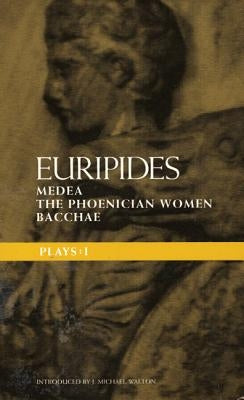Methuen Drama
Euripides Plays: 1: Medea; The Phoenician Women; Bacchae
Euripides Plays: 1: Medea; The Phoenician Women; Bacchae
Couldn't load pickup availability
Always controversial, Euripides' plays are now celebrated for the subtlety of their characterisation and their unorthodox dramatic style. This volume contains three of his finest tragedies: Medea, the abandoned wife, who murders her own children; The Phoenician Women, a further twist in the story of Oedipus and Jocasta; and Bacchae, a macabre and complex play, about the power and irrationality of Dionysos. These translations are by David Thompson and J. Michael Walton.
With an introduction by J. Michael Walton
Author: Euripides
Publisher: Methuen Drama
Published: 10/13/2006
Pages: 192
Binding Type: Paperback
Weight: 1.01lbs
Size: 11.69h x 8.27w x 0.40d
ISBN: 9780413752802
About the Author
Walton, J. Michael: - J. Michael Walton has published and edited seven books on classical theatre history and has nine translations of Euripides plays in print, many on the Methuen Drama list. He is Emeritus Professor of Drama at the University of Hull where he taught from 1965 to 2002. While there he directed numerous plays and taught courses in Classical Theatre, Masks and Puppets, Russian Theatre, American Theatre, Nineteenth and Twentieth Century Theatre, Directing and Acting.Euripides: - Euripides (484-406 BC) was a Greek dramatist. The last major tragic playwright of the classical world, he has also been called "the first modern". Euripides was not highly successful in his lifetime, winning the first of only five victories at the Dionysia at the age of 43. By the end of the 19th century, however, Euripides was the most acclaimed Greek playwright. And, when the Royal Shakespeare Company presented a ten-play cycle The Greeks in 1980, seven of the works were by Euripides. Only 17 of his 92 plays survive. These include Medea, The Bacchae and Electra. Euripides's innovations included the deus ex machina and the formal prologue. He used simple everyday language, bringing a new realism to the stage. Although contemporaries accused him of killing tragedy, he humanized drama by adding elements of sentiment, romance, and even comedy. He was the first to argue against the social inferiority of women, and the first to show women in love. He was also the first to explore such subjects as madness and repression. A recluse, he shunned Athenian civil and social affairs, and in later life would sit all day in a cave on Salamis overlooking the sea as he contemplated and wrote "something great and high". In 408 BC Euripides was exiled for his unorthodox views to Macedonia, where he died less than two years later. According to tradition, when the Spartans arrived to burn Athens, they desisted after a reminder that this was Euripides's city.
Share


